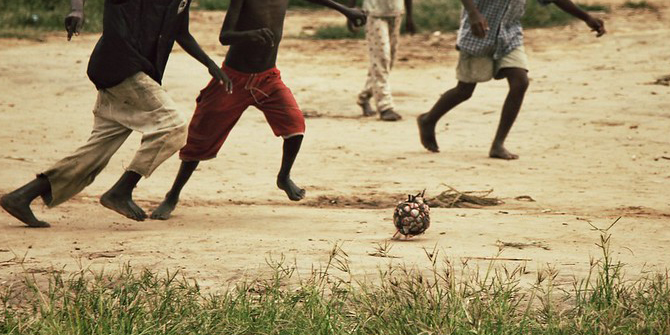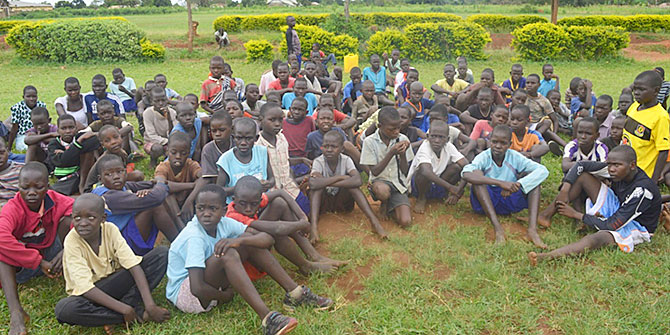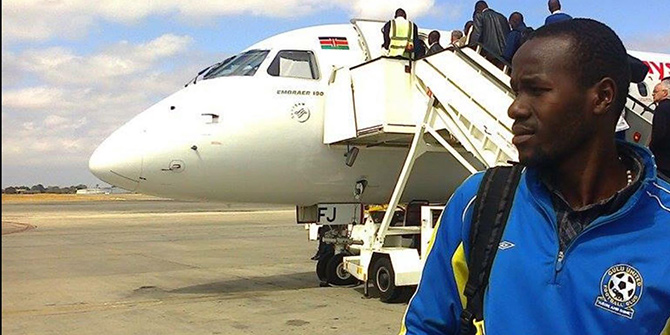A football stadium in the centre of Ethiopia’s capital has become a place for fans to voice their political opinions at a time when genuine debate is being stifled, Hewan Marye writes.
In 1994, the committee formed to ratify the Ethiopian constitution met to discuss the draft. Shaleqa Admasse Zeleqe, a representative of Addis Ababa, criticised the proposed draft and in particular a specific article on leasing land to the public.
“If people were asked if they accept the lease idea at the stadium where all ethnicities meet, they would all say, ‘May God protect us from that’.”
In this quote, Shaleqa Admasse Zeleqe accurately expressed the value of Ethiopia’s football stadiums as arenas of public expression. This is as true today as it was twenty-eight years ago. As I recently wrote football fans at the Addis Ababa stadium participate in poetic dialogue with one another about a host of topics. They raise questions about economic and political marginalisation, the ethics of the media and police, and about identity and belonging.
Football in Ethiopia
The Ethiopian football scene mostly consists of matches in the Ethiopian premier league and the international fixtures of the national team, the Walya. The premier league was started in 1944 and involves sixteen clubs from across Ethiopia. Among these clubs is the popular Ethiopia Coffee, endearingly called Bunna. Its fans, who are among Addis Ababa’s most economically marginalised groups, face extensive state censorship and police surveillance because of the proximity of their home ground, the Addis Ababa stadium, to the centre of the Ethiopian government.
Bunna fans are also called out by the media for their ‘hooliganism’, their rowdy behaviour, and for consuming cigarettes and alcohol in the stadium. They are, in sum, considered the problematic fans of the Ethiopian premier league and often find themselves under police supervision in and around the Addis Ababa Stadium.
Politics on the terraces
Nonetheless, Bunna fandom appeals to young football enthusiasts as it is also marked by politically engaged chants. For example, during Bunna’s match against Adama City F.C. in 2018, Bunna fans started chanting «ሁሌ በዱላ» (always using sticks) to which police started beating fans with sticks.
What triggered the police violence against Bunna fans is unclear, but the chant wasn’t only in reference to the police surveillance fans were accustomed to at the stadium. Their words were also about the normalisation of police brutality in Addis Ababa and the heightened sense that the government refuses to respond peacefully to people’s questions and opinions. The football match proceeded, and the police soon returned to their posts. Immediately after this, the state broadcaster’s cameramen run to film the angry fans at Mismar Tera, the turf of Bunna fandom, to which Bunna fans broke out in unison,
“ያዩናል ያዩናል አዎ ያዩናል
They look at us, yes, they look at us
ይመለከቱናል አዎ ያዩናል
They watch us, yes, they look at us
በባዶ ካሜራ ቡንዬ ፎቶ ያነሱናል
With empty cameras, Bunniye, they take pictures of us”
Bunna fans were seen singing enthusiastically, rejoicing in their ability to make fun of the media. They were claiming that “they” take pictures of them with cameras that have no film. The incongruity is obvious; empty cameras do not take pictures. Bunna fans are declaring that though they’re being watched, nobody is truly documenting what is happening – highlighting the possibility that the media fabricate news about them. This chant eschews the trite presentation of a trouble-making fan-base and through such defensive mechanisms, Bunna fans strengthen their bond to their club, and one another.
In April 2018, the Ethiopian People’s Revolutionary Democratic Front undertook a change of leadership following an internal schism and persistent public protests. Ethiopia was about to embark upon unprecedented changes. These changes, however, were not without their fair share of violence and confusion highlighting the complicated nature of the political situation in the country. Through these months of change, Bunna fans continued to voice public opinions at the stadium. In October 2018, as Bunna played Defence Force S.C. at the Addis Ababa Stadium with the newly appointed deputy mayor of Addis Ababa in attendance, Bunna fans chanted,
“ኢንጂነር ስመኘው
Engineer Simegnew
እንዲህ ብሎ
(fans point to the opposite side of their neck with their hands over their heads as they say) by doing so
እራሱን ገደለ
he killed himself”
This grim chant was a public mockery of the verdict given by the state that Engineer Simegnew, the man in charge of the construction of the Grand Ethiopian Renaissance Dam, who was found dead in his car, had committed suicide. Popular opinion held that he was murdered. Fans were acting out the impossibility of the act by moving their hands over their heads to show that one can’t commit suicide and be found dead in the position he was found in.
These examples demonstrate how Bunna fans use the stadium as a space to criticise the media, police, and the government. Through their concise and often poetic chants, they are seen questioning and challenging those with power. Most importantly, their fandom highlights the absence of avenues for expression under an authoritarian state and how youth find ways to subvert this. At a time of increased political instability in Ethiopia and within a national community where there are few spaces available for genuine dialogue between citizens and their rulers, the stadium is used by football fans as a space of self-expression and exercise in voicing one’s opinions.
Photo credit: Hewan S.Marye





